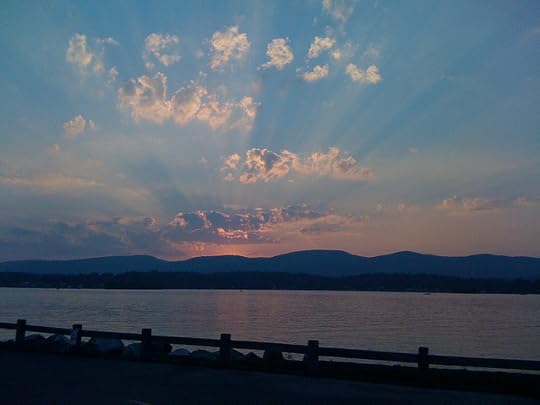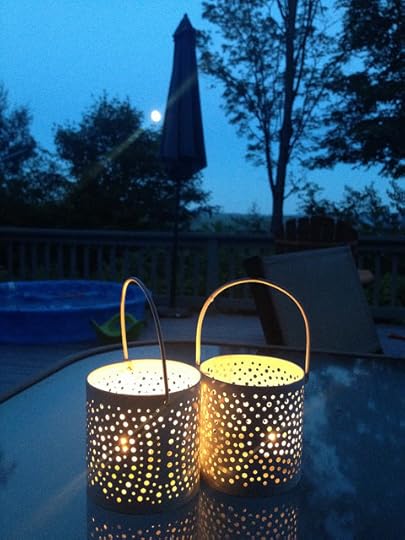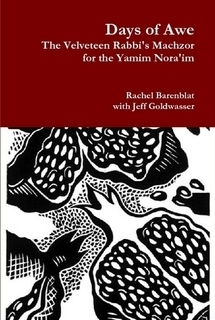Rachel Barenblat's Blog, page 152
July 28, 2014
Preparing for Elul
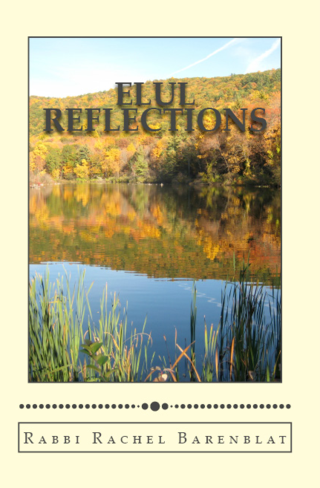 Today is Rosh Chodesh Av, the first day of the lunar month of Av. One month from now we'll enter Elul, the month immediately preceding the Days of Awe. Many of us strive to make Elul a month of introspection and spiritual preparation for the powerful holidays ahead.
Today is Rosh Chodesh Av, the first day of the lunar month of Av. One month from now we'll enter Elul, the month immediately preceding the Days of Awe. Many of us strive to make Elul a month of introspection and spiritual preparation for the powerful holidays ahead.
Last year I blogged daily during the month of Elul, as part of #blogElul, an internet-wide carnival of posts on pre-high-holiday themes organized by Rabbi Phyllis Sommer (a.k.a. Ima Bima.)
Some weeks after the holidays were over, I began receiving email from my friend and teacher Rabbi Daniel Siegel in response to my #BlogElul postings. He suggested that I might share these Elul meditations in printed form, for those who would enjoy having a tangible book to hold and leaf through.
I did a bit of editing and pruning and layout work. And now, in time for the Elul to come, I offer a new chapbook of Elul material: Elul Reflections. Here's a description:
Prepare for the Days of Awe (the High Holidays) by reading these daily meditations for the lunar month of Elul, exploring the season's themes of forgiveness, transformation, and change. Each day of Elul is matched with a short essay or poem arising out of that day's theme. And each theme is a verb, an invitation to action, from "Prepare," "Act, and "Bless" to "Know," "Believe," and "Return."
This volume is meant to help you enter wholly into the spiritual potential of this month, the season of teshuvah, repentance/return. Also in these pages: a Psalm 27 variation by Rabbi Brant Rosen, a set of other Elul resources, and ample space to jot down your own responses as you do your Elul work.
Of course, you're also welcome to simply return to my 2013 archives and reread last year's posts here. And who knows, it's possible I'll do #blogElul again this year too, in which case those who subscribe to this blog will receive new material every day of Elul once again! But for those who liked what I shared last year and would enjoy being able to reread those posts in bound form, here you go. My thanks are due to Reb Daniel for his encouragement, and to R' Phyllis Sommer / Ima Bima for running #BlogElul in the first place.
$9 at Amazon |£ 5.61 at Amazon UK | €6.59 at Amazon Europe
July 18, 2014
Taking a break
I'm taking a break from the internet for a week or so.
May the Shabbat which begins tonight bring peace to our hearts and to our troubled earth.
May the week which follows be one in which kindness and compassion can flourish.
Be well, everyone.
July 17, 2014
How news and social media can hurt us
 Lately I've been talking with rabbinic colleagues about how best to minister to our congregants who are struggling with the news out of Israel/Palestine. We're hearing from people who are unable to fall asleep because they can't stop thinking about the images of destruction and grief, or who wake up and immediately start agonizing about the conflict or worrying about loved ones.
Lately I've been talking with rabbinic colleagues about how best to minister to our congregants who are struggling with the news out of Israel/Palestine. We're hearing from people who are unable to fall asleep because they can't stop thinking about the images of destruction and grief, or who wake up and immediately start agonizing about the conflict or worrying about loved ones.
For some, the realities of what's happening there provoke a crisis of faith. For others, those realities provoke profound anxiety. How can we best care for people who are struggling in these ways? The question feels especially relevant to me because not only am I tasked with extending pastoral care to people who are struggling, but because I myself am also struggling to maintain my emotional and spiritual equilibrium in the face of the violence, destruction, and fear.
Maybe the first thing we can do is honor the reality of the struggle. A colleague just pointed me to something I found really interesting -- research showing that media exposure to trauma can create trauma in those who are watching, even from afar.
Tens of thousands of individuals directly witnessed 9/11, but millions more viewed the attacks and their aftermath via the media. In our three-year study following 9/11, my colleagues and I found that people who watched more than one hour of daily 9/11-related TV in the week following the attacks experienced increases in post-traumatic stress (PTS) symptoms (e.g., flashbacks, feeling on edge and hyper vigilant, and avoidance of trauma reminders) and physical ailments over the next three years.
The previous conventional wisdom had been that indirect media-based exposure to trauma is "not clinically relevant." But these researchers found otherwise. The article continues:
The relevance of indirect media exposure became apparent again after last April’s Boston marathon. In the days following the marathon bombings, my University of California, Irvine colleagues and I decided to replicate our 9/11 study and examine the impact of media exposure to the Boston Marathon bombings. We sought to look at all types of media: how much TV people watched, their exposure to disaster-related radio, print, and online news, and their use of social media like Facebook, Twitter, YouTube, and Vimeo in the week following the bombings. We were especially interested in responses to social media coverage. Unlike traditional media that warn us about the gruesome nature of an image before showing it to us, social media typically display such images without warning.
Here's the conclusion to which I really want to draw your attention:
People who consumed lots of bombing-related media in the week after the bombings were six times more likely to report high acute stress than those who were at the Boston Marathon.
Let me be clear -- I am not suggesting that those of us who are following stories out of Israel, the West Bank, and Gaza from afar are experiencing more trauma than those who are there. I recognize that from afar we can only barely begin to grasp the terror and the trauma. My child is safely watching cartoons; other peoples' children have been terrorized and killed. There is no comparison. What I am suggesting is that the media we consume has an impact in all four worlds: spiritual, intellectual, emotional, and even physical.
I know that my social media experience right now is one of marinating in a constant broth of tragedy and anger. I know that I feel compelled to browse Facebook and Twitter -- both because they are online spaces where I typically check in many times a day, and because right now they're also sources of important news -- but every time I do so I come away crying or short of breath because the situation is so unbearable. Part of what's valuable to me about the article I've just cited is that it acknowledges and legitimates my lived experience.
It's important that the realities of this conflict be expressed. I know that it's important to those who are experiencing the tragedy and trauma of war that their stories and images be shared with the world. I understand that and I honor it.
And that makes it extra-important that we who are watching from afar -- whether via television news, or social media, or both -- exercise the good judgement to take care of our own emotional and spiritual boundaries. (See my post from a few weeks ago, Not everyone can carry the weight of the world.) Overexposure to trauma, even from afar, can be damaging.
Rabbi Jay Michaelson recently wrote an essay for the Forward called 5 Ways To Turn Down the Social Media Flame. Here's an excerpt:
We do create communities of shared values, online as well as in person, and if those values are extreme one-sidedness bereft of analysis or reflection — well, that matters, if nothing else, to the kinds of communities in which we and our children are supposed to live.
Over the last week, I private-messaged half a dozen people who have frequently posted on Facebook one-sided accounts of the current violence. The (small, unscientific) sample included an ardent Zionist, moderate/two-state Zionists, and a BDS-activist anti-Zionist. Not one of them agreed to post accounts both of the Israeli suffering and of the Palestinian suffering. Each side insisted the other side is morally deficient, that there is no equivalence between them, and that there’s already too much attention to the other side’s suffering.
If a bunch of privileged Americans with so little at personal stake can’t internalize the importance of multiple narratives, how do we expect Israelis and Palestinians — both of whom are living under threat of imminent death, while I sit behind a screen in Brooklyn — to do better?
What he describes -- privately connecting with people who occupy different places on the spectrum of opinion, and discovering that none of them are willing or able to post accounts of the other side's suffering; each side insisting that the other side is "morally deficient" and that there is no equivalence between them -- that's been my experience, too. The entrenchment is profound, and most of us aren't open to hearing the narratives of the "other side." This is another variation on the echo chamber of homophily about which I've written before (Listening across our differences.)
It's tempting to want to respond to the echo chamber by shouting more loudly. But I don't think that actually works, and I think that giving in to that impulse can engrave hurtful grooves on our hearts. I've written about that before, too -- how easily the mind becomes accustomed to a thought pattern and gets stuck there; how our repeated thoughts carve grooves on the soft clay of our consciousness (Carving new grooves on heart and mind, 2013.)
Jay also writes about simple ways each of us can take control of our interactions. He shares the questions he asks himself before posting, forwarding, or amplifying news about Israel / Palestine. He concludes with the final question he asks himself before posting:
Why post at all? Rabbi Kurtzer has proposed a 24-hour “social media fast” this week, mirroring the fast of the 17th of Tammuz. That’s an excellent start. I suggest a different culinary metaphor, though. Let’s post only when it’s glatt kosher — or more precisely, glatt yosher, i.e., extremely just, righteous, compassionate, clear. If we pick and chose before posting the same way a Hasid picks and chooses before eating broccoli, our Facebook feeds would be a lot thinner and our collective blood pressure would be lower.
I appreciate his suggestion that we post only when we can exercise the discernment to tell that what we're writing is just, righteous, compassionate, and clear. And I would add: we should exercise that same discernment in deciding how and whether to participate in social media even as readers. What we take in, through reading or viewing, enters our hearts and minds. Some of us can manage that without experiencing trauma. Some of us are more emotionally porous and may be hurt by the repeated exposure. (And any given person may be at a different place on that spectrum at different times -- maybe one day you're able to manage what you're reading, and the next day it becomes too much.)
If watching the news or reading your social media feeds leaves you struggling with crying jags, panic attacks, nightmares, anxiety which won't let up, you are not alone, and what you're feeling is real. Different people heal in different ways, but I've found that the best tools include disengaging for a time from social media and the news, and when the obsessive anxious thoughts recur, just noticing them, without judgement, and redirecting my thoughts in another direction. For me that usually means prayer, but use whatever works for you: music, exercise, thinking about an event you're looking forward to, calling a loved one, whatever works.
Marinating in a perennial bath of horrific news can actually cause harm. Whatever obligations you may feel to those who are suffering, you aren't helping them by harming yourself.
July 16, 2014
Fasting today with Jews and Muslims for peace
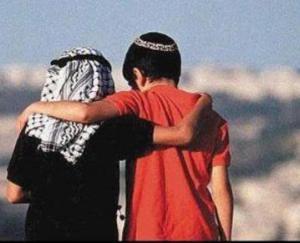 I don't usually fast on the 17th of Tamuz.
I don't usually fast on the 17th of Tamuz.
For that matter, I didn't even take on the practice of fasting for Tisha b'Av until a few years ago. (See This year's wrestle with Tisha b'Av, 2011.) I didn't grow up observing the minor fasts, and I've never taken them on as a practice.
Instead I've tended toward finding other ways of understanding 17th Tammuz. Instead of focusing on the breach of Jerusalem's walls 2,600 years ago, I ponder breaches in the emotional walls which keep us safe, or the internal and interpersonal walls which need to come down in order for genuine connections to form.
But this year there is so much trauma and tragedy in Israel and Palestine, so much grief and destruction and fear happening right now, that I am fasting today and I am dedicating my fast to peace, compassion and kindness in that beloved corner of our world where so many people are suffering.
This was not my idea. Across Israel and Palestine, groups of Jews and Muslims are consciously choosing to fast on this day in solidarity with one another as what was initially called a Hunger Strike Against Violence, and has become part of an initiative called בוחרים בחיים / اختيار الحياة / Choose Life. The idea came from Eliaz Cohen, an Israeli Jew who lives in Gush Etzion, and Ali Abu Awwad, a Palestinian Muslim who lives in Beit Ummar, north of Khalil (Hebron). Cohen is a poet and a self-identified second-generation "settler kid" who supports the idea of one homeland for two peoples. Abu Awwad is founder of Al Tariq (The Way), which teaches Palestinians principles of nonviolent resistance.
(For more, see the front-page story in yesterday's Times of Israel, Aided by calendar, Jews and Arabs Unite in Joint Fast: West Bank activists organize Choose Life, a shared initiative to combat political violence and promote coexistence.)
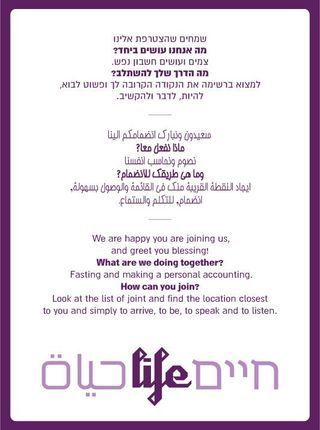 Though the fast originated in the Middle East, it has spread around the globe. Joint Jewish-Muslim fasts (and dual-faith study sessions and communal joint iftar / break-the-fast meals) are taking place not only in Israel and Palestine but also around the United States, in various locations around Europe, even in Kuwait. (For more information, you can check out the Choose Life FB page; for English speakers, I recommend the parallel site Fast for Peace, which arose independently but is very much the same.)
Though the fast originated in the Middle East, it has spread around the globe. Joint Jewish-Muslim fasts (and dual-faith study sessions and communal joint iftar / break-the-fast meals) are taking place not only in Israel and Palestine but also around the United States, in various locations around Europe, even in Kuwait. (For more information, you can check out the Choose Life FB page; for English speakers, I recommend the parallel site Fast for Peace, which arose independently but is very much the same.)
What does abstaining from food and drink for a day actually accomplish? I know that it won't change the external realities on the ground. But communal fasting is a very old Jewish way of connecting with others in grief and in hope. I hope that the fast will make an impact on we who are participating in it, and will inspire us to take action to bring peace and healing. And perhaps the fast will bring some hope to those who hear or read about it, and will inspire them to take action, too. Here's something written by Rabbi Jill Jacobs at T'ruah:
As Jews, we know that fasting is one of our tradition's main expressions of a public crisis. While most of us don't believe that God will literally heed our fast and come to intervene, we nevertheless yearn for a way to express our sorrow and to stand in solidarity with our brothers and sisters. Publicly embracing an interfaith spiritual action is a small step, but it is better than privately wringing our hands and beating our breasts.
I know from my other experiences of religious fasting (on Yom Kippur, which I've done almost every year since I became bat mitzvah, and on Tisha b'Av in more recent years) that a religious fast entails a kind of spiritual journey. I was in one spiritual / emotional place when the fast began this morning; I expect that I will be in a different place by the time it is over. I won't know where the journey is going to take me until I get there.
The original call to fast for peace arises out of the violence, fear, and heartbreak happening in Israel, the West Bank, and Gaza right now. There's a natural commonality in the fact that both Jewish and the Muslim communities will be fasting today from sunup to sundown. I am glad to join Jews and Muslims around the world in dedicating our fast to praying for an end to the violence in the Middle East.
I also find myself returning to prayers for kindness and compassion, both in those wartorn places and in the rest of this world. The violence isn't happening on the ground where I live, but the hatred and mistrust which have ousted kindness and compassion from the hearts of those who commit that violence -- that hatred and mistrust are everywhere.
 My online friend Lee Weissman, who blogs and tweets under the moniker Jihadi Jew, recently posted that he can no longer engage in conversations about Israel and Palestine via social media because the vitriol is so great that he has given up that public discourse. I understand the impulse. The rhetoric I've been seeing (from all "sides") has been bringing me to the brink of panic attacks because I am so emotionally invested that my heart feels bruised by every instance of violence, every angry comment, every insistence that "they" deserve whatever they get. If we can't collectively transcend that kind of thinking, I don't see how the situation will ever improve.
My online friend Lee Weissman, who blogs and tweets under the moniker Jihadi Jew, recently posted that he can no longer engage in conversations about Israel and Palestine via social media because the vitriol is so great that he has given up that public discourse. I understand the impulse. The rhetoric I've been seeing (from all "sides") has been bringing me to the brink of panic attacks because I am so emotionally invested that my heart feels bruised by every instance of violence, every angry comment, every insistence that "they" deserve whatever they get. If we can't collectively transcend that kind of thinking, I don't see how the situation will ever improve.
17 Tamuz is the day when the Jewish community remembers the breach of Jerusalem's city walls by the Babylonian army in 586 BCE. That breach was the first damage to the city's integrity. Three weeks later, the Babylonian army destroyed the Temple and exiled the Jews. This year what is broken on 17 Tamuz is my heart. I've always been a "sensitive soul," moved by strong emotion (both my own feelings, and those expressed by those around me). And I was in Israel and the West Bank only a few months ago, which rekindled my feeling of connection with that land and with its peoples. Maybe these are the reasons why this year the renewed violence and bloodshed there are so emotionally and spiritually devastating to me.
In the traditional Jewish understanding, a public communal fast can be a tool of teshuvah / turning-toward-God, an expression of grief and mourning, and/or an opportunity for supplication and pleading with God. My fast against violence today aims to be all three of these. I seek to make teshuvah for the ways I've been complicit in allowing violence to continue. I grieve every single death in the Israeli-Palestinian conflict, most especially those of children. And I ask God with all my heart, all my soul, and all my might to help us build a different world, a world of connection and compassion and peace. Please, God, please, God, please.
I'll close this post with a prayer written by Sheikh Ibtisam Mahamid and Rabbi Tamar Elad-Appelbaum, distributed by the Choose Life folks along with prayers and scriptural quotations for study in Hebrew, Arabic, and English. They write:
God of Life
Who heals the broken hearted and binds up their wounds
May it be your will to hear the prayer of mothers
For you did not create us to kill each other
Nor to live in fear, anger or hatred in your world
But rather you have created us so we can grant permission to one another to sanctify
Your name of Life, your name of Peace in this world.
For these things I weep, my eye, my eye runs down with water
For our children crying at nights,
For parents holding their children with despair and darkness in their hearts
For a gate that is closing and who will open it while day has not yet dawned.
And with my tears and prayers which I pray
And with the tears of all women who deeply feel the pain of these difficult days
I raise my hands to you please God have mercy on us
Hear our voice that we shall not despair
That we shall see life in each other,
That we shall have mercy for each other,
That we shall have pity on each other,
That we shall hope for each other
And we shall write our lives in the book of Life
For your sake God of Life
Let us choose Life.
For you are Peace, your world is Peace and all that is yours is Peace,
And so shall be your will and let us say Amen.
Amen.
July 14, 2014
A prayer in remembrance - now in Hebrew
Not long ago I posted a prayer co-written with Rabbi Lynn Gottlieb in remembrance of Naftali Fraenkel, Gilad Sha'ar, Eyal Yifrah, and Muhammad Hussein Abu Khdeir. (It's here: A prayer in remembrance.)
Rabbi Lila Veissid, who serves Kibbutz Ha-Ma'apil in central Israel, has translated that prayer into Hebrew. With her gracious permission, her translation is reprinted here.
תפילת זיכרון
מאת הרבה רחל ברנבלט
והרבה לין גוטליב
יהי רצון שזכרם של בנינו
שנהרגו בשל שנאה חסרת פשר
יהיה לברכה.
יהי רצון שרוחם תעלה
ותתנחם בחיבוקה החם
והאימהי של אלוהים.
יהי רצון שילדינו היקרים יהיו בטוחים מכל צרה.
יהי רצון שכל הילדים יהיו ילדינו.
יהי רצון שנגן על כל ההורים מן השכול.
יהי רצון שלבבנו ולבבם של בני עמנו
יירפא במהרה בימינו
מפצעי העבר וההווה.
יהי רצון שכל הורה אבֵל ימצא ניחומים.
יהי רצון שנזכה לראות את היום
שבו לא יהיו עוד הורים אבֵלים
(You can read the prayer in English at the original post: A prayer in remembrance, July 3 2014.)
July 13, 2014
Poetry and prayer are all I've got
I have been watching the news (and reading blog posts and tweets and Facebook updates) out of Israel and the Palestinian territories with a sense of unbearable heartbreak. It brings me to the brink of something like a panic attack: my chest tightening, my throat choked with tears, the embodied feeling that the grief will wash me away altogether. And I am aware that those who live there are experiencing something far more powerful.
The only thing which brings any comfort is poetry and prayer. Bethlehem Blogger posted A prayer in times of violence, which though it is explicitly Christian speaks to me nonetheless. Wendell Berry's poem The peace of wild things speaks right to my heart. I daven the oseh shalom blessing -- "may the One Who makes peace in the high heavens make peace also for us" -- with particular fervor.
If there are prayers or poems which bring you comfort at times like these, please feel free to share them in the comments so that other readers (and I) can benefit from them.
I wrote a prayer in 2012 called Prayer for the Children of Abraham / Ibrahim, which begins:
For every aspiring ballerina huddled
scared in a basement bomb shelter
For every toddler in his mother's arms
behind rubble of concrete and rebar
For every child who's learned to distinguish
"our" bombs from "their" bombs by sound...
I hate that it is once again resonant. I yearn for the day when this prayer will look outdated and ridiculous -- when the children of our children, running across this prayer in some shred of their grandparents' generation, will say "I can't believe that war went on for so long." Please, God, may the day come speedily and soon.
July 12, 2014
Shabbat
July 11, 2014
A psalm of need before Shabbat
Shekhina, I need to recharge
help me find a dock
with the right number of pins.
I'll send You every gratitude
every blessing, spoken and unspoken
every yearning.
Install Your presence on my heart
install comfort
install forgiveness.
I can't face murder and grief
without despair anymore:
update my trust.
When my system is corrupted
by vindication and despair
update my kindness.
Toggle my settings
so no matter where I go
I have five bars of You.
In my post about Reb Zalman z"l (may his memory be a blessing), Remembering my rebbe, I wrote about his love of computer metaphors. I thought of him as I wrote this psalm this week.
May the coming Shabbat bring peace and recharging to everyone who needs it -- especially in the wartorn Middle East, where I grieve every death of recent days.
July 9, 2014
Descent for the sake of ascent: the fast of 17 Tamuz
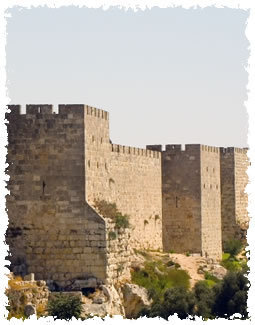 On Tuesday, July 15, many Jews will observe Tzom Tamuz, "the fast of Tamuz" -- one of Judaism's minor fast days, commemorating the breach of Jerusalem's city walls which led (three weeks later) to the destruction of the Second Temple by the Romans in 70 C.E.
On Tuesday, July 15, many Jews will observe Tzom Tamuz, "the fast of Tamuz" -- one of Judaism's minor fast days, commemorating the breach of Jerusalem's city walls which led (three weeks later) to the destruction of the Second Temple by the Romans in 70 C.E.
I say "many Jews" because I know that the minor fasts are not universally observed, especially in liberal Jewish communities. The notion of commemorating the first chink in Jerusalem's armor almost two thousand years ago may seem strange to us.
But I think there's value in observing 17 Tamuz, and being conscious of the Three Weeks which link it with Tisha b'Av, even if you do not fast, and even if you aren't certain you actually want to mourn the fall of a Temple you can barely imagine.
There is a deep wisdom in the way the Jewish calendar unfolds. Our festivals and fast days are waypoints along the journey we travel each year. 17 Tamuz marks the beginning of the descent toward Tisha b'Av. At Tisha b'Av, we mark the beginning of the ascent toward the Days of Awe.
In Hasidic tradition there's the idea that often in order to rise, one first has to fall. Yeridah tzorech aliyah: one has to go down in order to be able to go up. Descent for the sake of ascent. This drama plays itself out in a variety of places in Torah -- for instance, in the Joseph story, in which "descent for the sake of ascent" is a recurring motif. The downs are necessary precursors to the ups.
For Lurianic kabbalists, the whole of creation was a shattering which it is our unique privilege to be able to rebuild. If there had never been a rupture, then there couldn't be a healing.
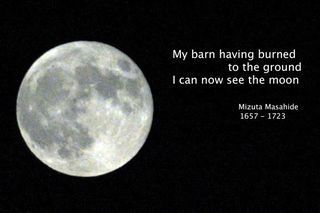 This drama plays itself out on the stage of every human life. We fall down, we get up again. And while our modern sensibilities may be offended by the notion that tragedy or trauma is necessary in order for growth or forward motion to appear, I believe that there are gifts to be found when circumstances have laid us low. As the 17th-century Japanese poet Mizuta Masahide wrote, "My barn having burned down, I found I could see the moon."
This drama plays itself out on the stage of every human life. We fall down, we get up again. And while our modern sensibilities may be offended by the notion that tragedy or trauma is necessary in order for growth or forward motion to appear, I believe that there are gifts to be found when circumstances have laid us low. As the 17th-century Japanese poet Mizuta Masahide wrote, "My barn having burned down, I found I could see the moon."
17 Tammuz, the Three Weeks which follow it, and Tisha b'Av which comes at the end of those weeks, are a time for us to delve together into descent. It's not only "my barn" which has burned down -- it's our barn, the place which was spiritual home for all of us together. It's not only my life which sometimes contains brokenness or sorrow -- it's all of our lives. We're in this together.
It can be tempting to want to paper over the places that hurt. To look on the bright side, to put on a happy face, to focus on the positive. I do these things all of the time. But 17 Tammuz and the weeks which follow are an opportunity to let ourselves experience moments of descent, together.
17 Tamuz is a day to consider: when and how do your "walls," the boundaries of your emotional and spiritual integrity, feel breached? What is it like to feel that something painful has come through your defenses? When and how do we come to feel that the integrity of our community has been shattered? What issues, subjects, or sore spots make us feel defenseless and alone?
The tradition says that 17 Tammuz is the anniversary of the day when Moshe came down the mountain, saw the people worshipping the golden calf, and in heartbroken fury shattered the first set of stone tablets containing God's words. What are the idols our communities have fallen into holding sacred? Can we allow ourselves to grieve the ways in which our communities are not yet what we most yearn for them to be?
The point of 17 Tammuz and the Three Weeks and Tisha b'Av isn't wallowing in anger and sorrow. It's allowing ourselves to recognize the things that hurt, the places where we are broken, so that together we can emerge from those places humbled and energized to begin the climb toward the spiritual heights of the High Holidays. Descent for the sake of ascent. If we're willing and able to go down together, we build bonds of community which will lift us to greater heights when it's time to climb up.
All of the things I've just written are, I think, true every year as we reach this moment in our seasonal-liturgical cycle. Here is something which is unique to this year:
This year the 17th of Tammuz falls during the Muslim holy month of Ramadan, when our Muslim cousins are fasting from dawn to nightfall every day. (This "minor fast" in our tradition is observed in the same way -- morning to night, not 25 hours like Yom Kippur.) And this year, 17 Tammuz arises amidst tremendous bloodshed and suffering in Israel and Palestine -- the murders of the three Israeli teens Naftali Fraenkel, Gilad Sha'ar, and Eyal Yifrah; the murder of Muhammad Hussein Abu Khdeir, apparently burned alive; Hamas firing rockets into Israel (see A view from Jerusalem - Israel at war); Israel bombarding Gaza in return (see You can never be emotionally ready).
Eliaz Cohen, a poet who lives in the settlement of Gush Etzion, has suggested that in the midst of so much sorrow and violence in Israel and Palestine, Jews and Muslims can choose to consciously fast on this day in solidarity with one another, as a "Hunger Strike Against Violence." You can learn more at Fasting Together, Jews and Muslims Choose Life (FB, mostly in Hebrew) 0r War Looming: Make Fasts of 17 Tammuz and Ramadan Hunger Strikes Against Violence (English). Some of us who are the talmidim (students) of Reb Zalman are taking on this joint fast in his memory, knowing that he wept for both the children of Abraham and the children of Ibrahim.
Whether or not you fast from food and drink on 17 Tammuz, I ask my Jewish and Israeli readers to please consider fasting from negative assumptions about our Muslim cousins and Palestinian neighbors; whether or not you are observing the Ramadan fast from food, I ask my Muslim and Palestinian readers to please consider fasting from negative assumptions about your Jewish cousins and Israeli neighbors in turn. May this minor fast day, and the following Three Weeks of opening ourselves to grief, bring us together in our low places so that together we may begin the work of building a better world.
Announcing a hardback edition of Days of Awe
When I announced the publication of Days of Awe: the Velveteen Rabbi's Machzor for the Yamim Nora'im, several people emailed to find out whether the prayerbook is available in a hardcover edition. It wasn't then, but it is now!
That original post -- which contains information about the book: what's in it, what priorities informed its creation, how it came together, and so on -- has been edited to include links to all three current editions:
Available at Amazon $7.53 L to R binding (paperback) | Available at Lulu $8.46 R to L binding (paperback)
and now also available in hardcover $19.59 L to R binding
The covers vary slightly. Both of the editions printed by Lulu have a deep red / almost maroon cover; the cover of the edition available at Amazon is a brighter, lighter red. And the paperback cover and the hardback cover have different designs (though both feature the beautiful pomegranate illustration by Natalia Moroz).
But the interior of all three editions is exactly the same, aside from the interior margin choices which have to do with whether the book is bound like a Hebrew book or like an English one. You will find all of the same prayers, poetry, artwork, photography, kavvanot (intentions), teachings, and texts, no matter which edition you choose.
A few people have asked, so I also want to add -- there are also other Jewish Renewal machzorim which are fantastic. I'm particularly fond of the New Kehilla Machzor edited by Rabbi David Shneyer and Machzor Kol Koreh edited by Rabbi Daniel Siegel. (You can see an excerpt from Kol Koreh in this post from Reb Daniel: Malchuyot, Zichronot, and Shofarot.)
Days of Awe was designed with the needs of my own community in mind, and I'm thrilled that it's being used in a few other communities this year as well -- but if you are interested in Jewish Renewal prayerbooks or in machzorim in general, I commend to you both New Kehilla and Machzor Kol Koreh. With machzorim, as with everything else, there's no single way to "do Renewal."
Enjoy!
Rachel Barenblat's Blog
- Rachel Barenblat's profile
- 6 followers


